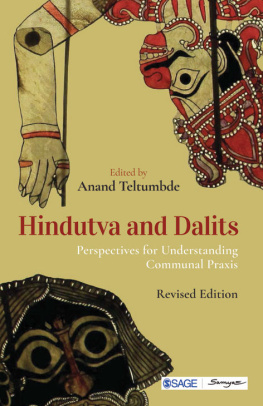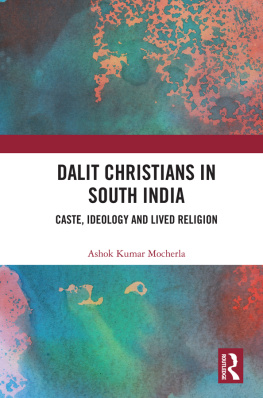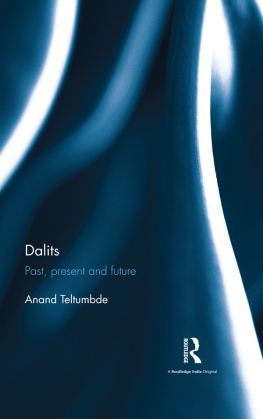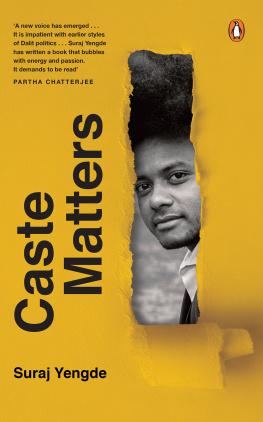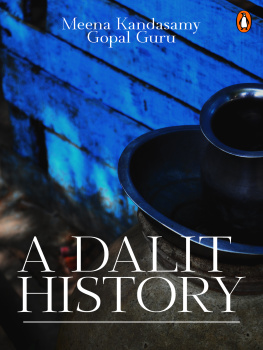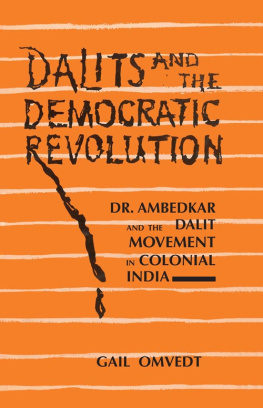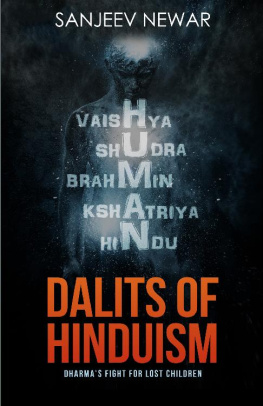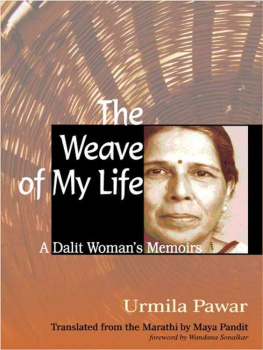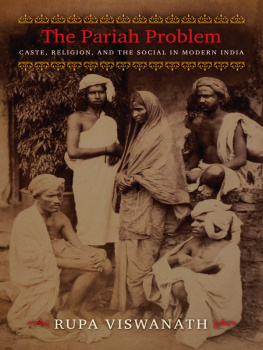
PADMA KAIMAL, K. SIVARAMAKRISHNAN,
AND ANAND A. YANG, SERIES EDITORS
The Gender of Caste
REPRESENTING DALITS
IN PRINT
Charu Gupta

Copyright 2016 Charu Gupta
Printed and bound in the United States of America
20 19 18 17 16 5 4 3 2 1
All rights reserved. No part of this publication may be reproduced or transmitted in any form or by any means, electronic or mechanical, including photocopy, recording, or any information storage or retrieval system, without permission in writing from the publisher.
PUBLISHED IN SOUTH ASIA BY PERMANENT BLACK
Delhi, India
http://permanent-black.blogspot.com/
UNIVERSITY OF WASHINGTON PRESS
www.washington.edu/uwpress
LIBRARY OF CONGRESS CATALOGING-IN-PUBLICATION DATA
Names: Gupta, Charu.
Title: The gender of caste : representing Dalits in print / Charu Gupta.
Description: Seattle : University of Washington Press, 2016. | Includes bibliographical references and index.
Identifiers: LCCN 2015035762 | ISBN 9780295995649 (hardcover : acid-free paper)
Subjects: LCSH: Dalit womenIndia, NorthPublic opinion. | Dalit womenIndia, NorthHistorySources. | CasteIndia, North. | Sex roleIndia, North. | Public opinionIndia, North. | Dalits in literature. | DalitsIndia, NorthSocial conditions. | India, NorthSocial conditions.
Classification: LCC DS422.C3 G864 2016 DDC 305.48/44 dc23
LC record available at http://lccn.loc.gov/2015035762
The paper used in this publication is acid-free and meets the minimum requirements of American National Standard for Information SciencesPermanence of Paper for Printed Library Materials, ANSI Z39.481984.
for
PETER ROBB
my teacher and guide
Contents
Abbreviations
BSP | Bahujan Samaj Party |
CMS | Church Missionary Society |
Deptt | Department |
EPW | Economic and Political Weekly |
Home Poll | Home (Political) Department |
IESHR | Indian Economic and Social History Review |
JAS | The Journal of Asian Studies |
Judl | Judicial |
MAS | Modern Asian Studies |
NAI | National Archives of India, New Delhi |
NICTBS | North Indian Christian Tract and Book Society |
NMML | Nehru Memorial Museum and Library, New Delhi |
NNR | Native Newspaper Reports of UP |
NWP | The North Western Provinces and Oudh (later United Provinces) |
OBC | Other Backward Castes |
OIOC | Oriental and India Office Collection, British Library |
PAI | (Secret) Police Abstracts of Intelligence of UP Government |
UP | The United Provinces of Agra and Oudh (later Uttar Pradesh) |
UPSA | Uttar Pradesh State Archives, Lucknow |
Preface and
Acknowledgments
This book grew out of an auto-critique of my first monograph, Sexuality, Obscenity, Community (2002), in which I had examined the interface between Hindu nationalism, gender, and the Hindi print-popular archive in colonial India. I realized that while highlighting representations of Hindu women, and positing social difference as an enduring aspect of modern gendering, I had inadvertently neglected Dalit women. Though I follow similar methodologies and archives, I have made gender and caste distinctions my focus in the present book.
The present work having come to fruition, I wish to acknowledge all those who made it possible. Among institutions, my primary debt is to the Nehru Memorial Museum and Library (NMML), New Delhi, which granted me a fellowship to pursue this research. I also thank the South Asia Council at Yale University, where I was Visiting Faculty; the University of Hawaii, for selecting me as a Rama Watamull Distinguished Scholar; and the Charles Wallace India Trust for a travel grant. A special thanks to the History Department at the University of Delhi for support and encouragement. I owe a great debt to the libraries and staff of the National Archives of India, the NMML, the Central Secretariat Library, and the Marwari Library, Delhi; the Bharti Bhavan Library and the Hindi Sahitya Sammelan Library, Allahabad; the Nagari Pracharini Sabha Library, Banaras; the Uttar Pradesh State Archives and the CID Office, Lucknow; the British Library, London; and the Divinity Library, Yale University. A warm thanks to Rupali Ghosh, Jaya, Sadhana Chaturvedi, and Ram Naresh Sharma, who gave all possible assistance in locating material.
Some of the ideas and material in this work were presented at conferences and seminars in a number of places: in India at the NMML, New Delhi; University of Delhi; Jawaharlal Nehru University, New Delhi; the Indian Council of Historical Research, New Delhi; the National Archives of India, New Delhi; the India International Centre, New Delhi; Kolkata University; Jadavpur University, Kolkata; Banaras Hindu University; the Govind Ballabh Pant Institute, Allahabad; and the Institute of Advanced Study, Shimla. In the USA at Yale University; the South Asia Studies Conference, Madison, 2008; the Sexuality and the Archive Colloquium, Duke University, 2009; the Conference of the Association of Asian Studies, Hawaii, 2011; the Conference on Engendering Rights in India, Chicago University, 2012; and the Berkshire Conference on the History of Women, Amherst, 2011, and Toronto, 2014; in Australia at the UNSW, Sydney; Macquarie University, Sydney; and the Conference on Subaltern Studies, Australian National University, 2011; in Scotland at the International Conference on Mutiny at the Margins, Edinburgh, 2007; in Nepal at the Exploring Masculinities Seminar, Kathmandu, 2008; in China at the Conference of the International Association for Feminist Economics, Hongzhou, China, 2011. I am grateful to the organizers, discussants, and participants for feedback and criticisms which have contributed greatly towards shaping my arguments.
My heartfelt thanks to many Dalit activists, writers, and friends who shared their invaluable insights with me, especially the late Bhagwan Das, a walking encyclopedia who lived very close to my home; and to Ashok Bharti, Anita Bharti, Rajni Tilak, Darapuriji, Daya Shankarji, and Mata Prasadji. My colleagues and friends in the History Department at the University of Delhi have extended deep warmth and constant help. I wish especially to thank Sunil Kumar, Sanghamitra Mishra, Aparna Balachandran, Biswamoy Pati, Amar Farooqui, Anshu Malhotra, Seema Alavi, Upinder Singh, Nayanjot Lahiri, Prabhu Mohapatra, and B.P. Sahu. My students, especially Vidhya Raveendranathan and Sharmita Ray, offered constructive ideas on various chapters, and I have learnt much from many of them in the course of my teaching.
Words are always insufficient when thanking friends who have provided unstinting support, and with many of whom I had stimulating discussions on parts of this book. Their warmth, along with constant encouragement and valuable suggestions, are integral to this book. Among them: Anand Swamy, Brinda Bose, Lata Singh, Anjali Arondekar, Ram Rawat, Badri Narayan, Crispin Bates, Geeta Patel, Neloufer de Mel, S. Charusheela, S. Shankar, Jayeeta Sharma, Sonia Sikka, Manuela Ciotti, Assa Doron, Kama Maclean, Debjani Ganguli, Kalpana Ram, Rochona Majumdar, Rahul Roy, Mary John, Nandini Sundar, Raj Kumar, Tapan Basu, Prathama Banerjee, Ravikant, Shahana Bhattacharya, Shohini Ghosh, Aditya Nigam, Nivedita Menon, and the late Sharmila Rege. My sincere thanks also to Majid Siddiqui, Philip Lutgendorf, Gautum Bhadra, Uma Chakravarti, Prem Chowdhry, Manager Pandey, Sumit Sarkar, Mrinalini Sinha, Barbara Ramusack, and Sudha Pai for sharpening my understanding and inspiration. My dear friend Jeremy Seabrook has read every part of this book and tightened it greatly. Anupama Rao and Peter Robb provided critical comments and insights, as only they could, which have distinctively shaped the book. K. Sivaramakrishnan contributed in innumerable ways and my heartfelt thanks to him. I offer my warm appreciation to Mahesh Rangarajan, who provided unfailing support at every stage. My acknowledgments would be incomplete without including Tanika Sarkar, whose role in my work is pivotal. I greatly admire her scholarship and she has been a pillar of strength and encouragement. Anonymous readers appointed by Permanent Black and the University of Washington Press offered astute comments that provoked significant revisions in the manuscript. Lorri Hagman of the University of Washington Press at Seattle offered many valuable suggestions which helped me sharpen focus and clarify issues that I had assumed were clear, but which were not. And, finally, Rukun Advani, who has spoilt me completely, so that I cannot now think of publishing any book of mine without his editorial support.
Next page

